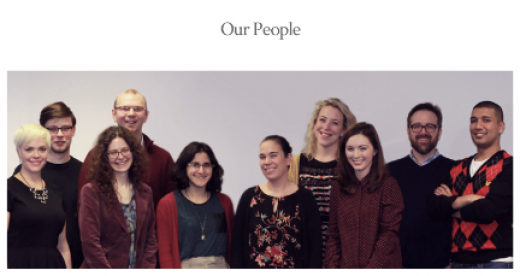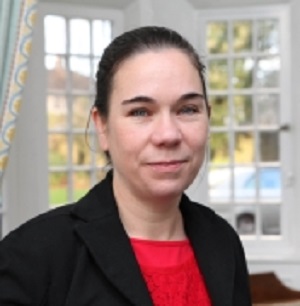
Níl an deighilt ghnáthúil idir an téarma teagaisc agus an tsamhradh taighde i gceist agam faoi láthair, os rud é go bhfuil tionscadal mór (acrainm RECIRC) faoi bhealach agam. Leanann obair thionscadail ar aghaidh: cruinnithe foirne, glantachán sonraí, blag le scríobh, agus aiste le críochnú. An difríocht is mó a mhothaítear i rith an tsamhraidh – ag lucht ollscoile uile – ná méadú na gcomhdhálacha. Táimse tar éis taighde RECIRC a chur i láthair i Sasana, in Éirinn, sna Stáit Aontaithe agus i gCeanada ó dheireadh mhí an Mheithimh.
‘Sé comhdháil ‘Early Modern British and Irish Catholicism’ an chéad cheann. Eagraithe ag an Centre for Catholic Studies in Ollscoil Durham gach dara bhliain, de ghnáth tarlaíonnn an ócáid seo i dtuaisceart Shasana. Ach i mbliana, bhí sé óstaithe i Lonndain, in áras a bhaineann le hOllscoil Notre Dame in aice le Cearnóg Trafalgar. Bhíos féin ag labhairt faoi aistriúchán téacsanna scríobhtha ag mná atá le fail i bhfoinsí áirithe mhairtíreachta, i dteannta beirt thaighdeoir eile atá bainteach le RECIRC: Bronagh McShane (ag caint faoi chlochar na nDoiminiceach Éireannach i Lisbon san seachtú agus ochtú aois déag) agus Emilie Murphy (dírithe ar na clochair Sasanacha a bhí ar deoraíocht sa Mhór-Roinn agus a gcuid scileanna teanga). Tá tuarascáil ar an gcomhdháil iomlán le fáil anseo.
Bhí na trí ócáid eile dírithe ar na Daonnachtaí Digiteacha – na feidhmeanna a bhaintear as nuatheicneolaíochtaí i mbun ceisteanna taighde na nDaonnachtaí. D’eagraigh Jennifer Redmond an chomhdháil, ‘Women’s History in the Digital World’, in Ollscoil Mhá Nuad i mí Iúil. ‘Séard a bhi ag ábhar na comhdhála ná na tionscadail taighde idirnáisiúnta digiteacha atá ar siúl ó thaobh stair na mban de. Tá tuairisc iomlán ar fáil anseo . Chaith mé seachtain i Washington D.C. níos déanaí sa mhí, rannpháirtí sa scoil samhraidh, ‘Early Modern Digital Agendas: Network Methodologies’, eagraithe sa Folger Shakespeare Library (féach sonraí anseo) . I rith na coicíse (agus ní ach rannpháirtí páirt-aimseartha a bhí ionam, áfach!), bhí teagasc agus dian-phlé ar bhogearraí gur féidir úsáid a bhaint as chun líonra sonraí, agus go háirithe gréasáin sóisialta, a thuiscint níos fearr ó thaobh na ndaonnachtaí de. Faoi dheireadh, i mí Lúnasa, thaisteal mé féin agus David Kelly (Bainisteoir na nDaonnachtaí Digiteacha, Institúid na Móra, OÉG) go Montreal, go dtí an gcomhdháil mhór bhliantúil a eagraíonn an Association of Digital Humanities Organizations. ‘Sé seo an chomdháil dhomhanda ar ábhar na nDaonnachtaí Digiteacha, le níos mó ná 800 toscairí. Bhíomar ag plé ceisteanna chomh-inoibritheachais le comhghleacaithe i gceannas ar na tionscadail an Women Writers Project (Northeastern) agus Collective Biographies of Women (Virginia). De réir mar atá níos mó tionscadail ag deighleáil le ceisteanna taighde cosúla, tá gá dul i gcomhar le chéile ar thóir chomh-thuisceana dhigiteach. Tá naisc go dtí an gclár agus achoimrí le fáil anseo.
Ní amháin ar son an chraobhscaoilte gur bunáisteach é freastal ar chomhdhálacha; is deis é buaileadh le saineolaithe an réimse staidéir agus foghlaim faoin taighde is déanaí chomh maith. Ach is fíor gur tráth ghnóthach a bhí ann!

TRANSLATION
Given that I am currently leading a big research project (for which the acronym is RECIRC), the customary divide between teaching term and research summer is less applicable to me this year. The work of the research project continues: team meetings, data cleaning, a blog to write, and a chapter to finish. The biggest difference for all of us working in universities during the summer is the intensification of conferences. I’ve been presenting the results of RECIRC research in England, Ireland, the USA and Canada since the end of June.
The first of these was the ‘Early Modern British and Irish Catholicism’ conference. Organised every other year by the Centre for Catholic Studies at Durham University, this conference is usually held in northern England. But this year it was hosted in London, at the University of Notre Dame London Gateway, located beside Trafalgar Square. I was speaking about the translation and circulation of women’s texts in martyrologies, alongside two other researchers associated with RECIRC: Bronagh McShane (discussing the Irish Dominican convent at Lisbon in the seventeenth and eighteenth centuries) and Emilie Murphy (who focused on the exiled English convents on the Continent and their language acquisition skills). A full report on this conference is available here.
The three other events focused on the Digital Humanities – the application of new digital technologies to Humanities research questions. Jennifer Redmond organised the ‘Women’s History in the Digital World’ conference in Maynooth University in July. Its subject was the array of international digital research projects relating to women’s history. An account of this conference is available here. I also spent a week in Washington D.C. later that month, participating in the ‘Early Modern Digital Agendas: Network Methodologies’ summer institute, held at the Folger Shakespeare Library (further details here). During this fortnight (I was only part-time visiting faculty), instruction and debate focused on network analysis and software, as applied to the better understanding of social networks from Humanities perspectives. Finally, in August, David Kelly and I (Digital Humanities Manager, Moore Institute, NUIG) travelled to Montreal, to the big annual conference organised under the auspices of the Association of Digital Humanities Organizations. This is the global conference on Digital Humanities, with more than 800 delegates attending. Our panel discussed questions of interoperability with colleagues leading the Women Writers Project (Northeastern) and Collective Biographies of Women (Virginia). As the number of research projects working on complementary questions increases, it is imperative that we devise ways for our individual projects to speak to each other. Links to the full conference programme and abstracts may be found here.
The advantages of attending conferences rest not only on dissemination but equally on the chance to meet and exchange ideas with experts in the field, and learn about up-to-date developments. Nevertheless, it certainly made for a busy season!


